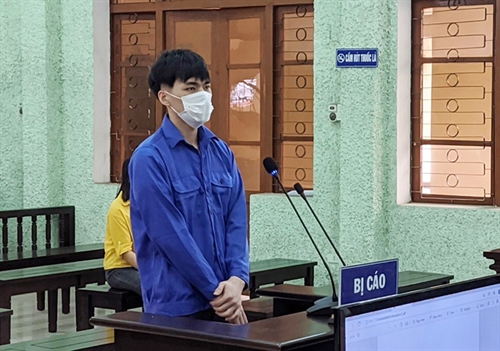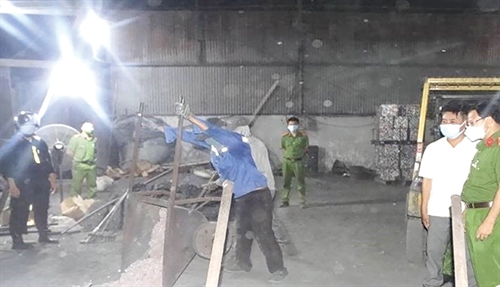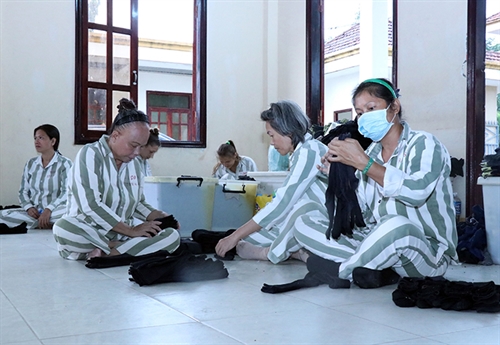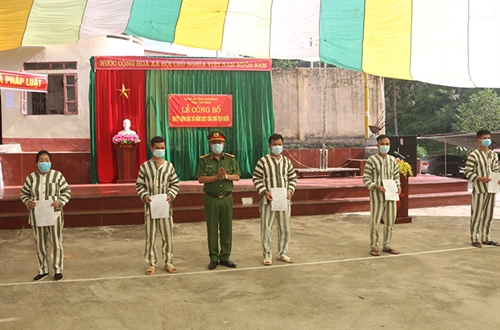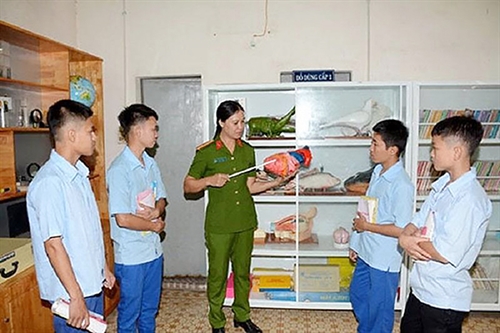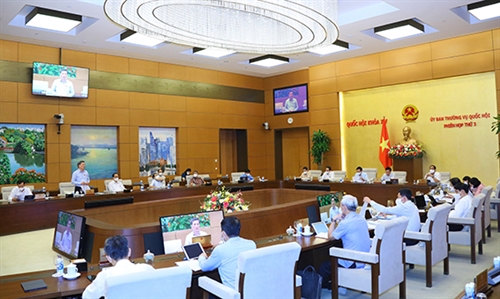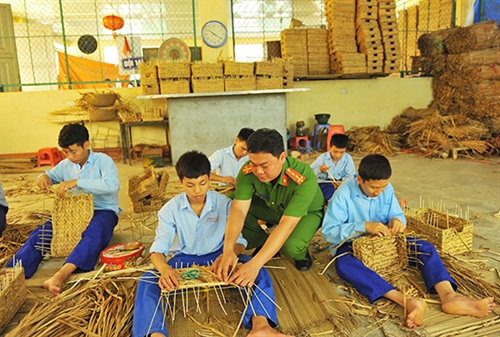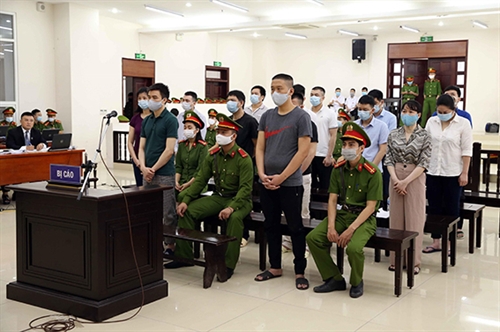Nguyen Van Nam, LL.D.Vice Dean of the Law FacultyPeople’s Security AcademyThe right not to be arbitrarily arrested or detained under international lawBased on the fundamental declaration in the 1948 Universal Declaration of Human Rights, the 1966 International Covenant on Civil and Political Rights (ICCPR)[1] concretizes the human right not to be arrested, detained, imprisoned or arbitrarily kept in its Article 9. The member states of the ICCPR are obliged to strictly implement Article 9 in the field of criminal procedure regarding arrest and detention measures. The international human rights law also requires every state to ensure that the arrest and detention of people comply with the provisions of the law.As recommended by the International Human Rights Committee, member states should clearly specify the time limit for temporary holding in custody or detention of persons arrested in criminal proceedings. At the same time, when exercising the right to detain or arrest people for custody or temporary detention as preventive measures, competent agencies must secure the rights of the accused and defendants in accordance with law, including the right to have access to legal aid; right to be informed; and right to obtain court rulings on whether the custody or temporary detention is lawful or unlawful.In 1988, the United Nations (UN) General Assembly adopted Resolution 43/173, setting out the principles that member states must follow to avoid arbitrary arrest and detention. Accordingly, firstly, detainment or detention in any form must be carried out by order of a competent authority and controlled by agencies in the judicial system (court or prosecutor’s office); secondly, competent state agencies carrying out arrest or detention must notify persons held in custody or detained persons of reasons for their arrest, custody or detention and crimes for which they are held in custody or detained and custody or temporary detention time limit; and thirdly, competent authorities of each member state should not apply arbitrary detainment or detention, and should guarantee the rights of detainees to self-defense and access to lawyers and other forms of legal aid.In order to further affirm the right not to be arbitrarily arrested or detained in criminal proceedings, the ICCPR also specifies cases in which human rights violations are prohibited[2].Securing human rights not to be arbitrarily arrested or detained in criminal proceedings in VietnamTo date, Vietnam has joined seven out of the nine basic international conventions on human rights[3]. The country has translated the provisions of international law on the right not to be arbitrarily arrested or detained into the domestic laws and regulations, including the 2013 Constitution, the 2014 Civil Procedure Code, the 2015 Criminal Procedure Code, the 2015 Penal Code (revised in 2017), the 2015 Law on Organization of Criminal Investigation Bodies, the 2015 Law on Enforcement of Custody and Temporary Detention Measures, the 2011 Law on Complaints, the 2011 Law on Denunciations, the 2019 Law on Execution of Criminal Judgments, and the 2017 Law on State Compensation Liability.The legal ground for securing the right not to be arbitrarily arrested or detained in criminal proceedings in Vietnam can be reflected in the following two aspects:Representatives of Tra Vinh province’s Public Security Department serve the arrest decision to Nguyen Van Cuoc who causes public disorder__Photo: VNA Firstly, the provisions on the right not to be arbitrarily arrested or detainedArticle 20.2 of the 2013 Constitution stipulates: “No one may be arrested without a decision of a People’s Court, or a decision or approval of a People’s Procuracy, except in case of a flagrant offense. The arrest, holding in custody, or detention, of a person shall be prescribed by a law.”Concretizing this provision, the 2015 Criminal Procedure Code (the Code) provides principles, grounds, order, procedures and competence for arresting and detaining people in accordance with law. Its Article 8 sets out the general principle of “respect for and protection of human rights and lawful rights and interests of individuals.”. Its Article 10 provides: “Everyone has the right to body inviolability. Nobody shall be arrested without a court’s decision or procuracy’s decision or approval, except for offenders who are caught in the act. The holding in case of emergency, arrest, holding in custody, and temporary detention of persons must comply with this Code. Torture, extortion of statements, corporal punishment or any form of treatment infringing upon human body, life or health is strictly prohibited.”These provisions are conformable with Article 9 of the ICCPR and the UNCAT. In addition, Article 109.2 of the Code specifies cases of arrest, including arrest of persons held in case of emergency, arrest of offenders caught in the act, arrests of wanted persons, arrest of the accused or defendants for temporary detention, and arrest of persons required to be extradited. To ensure that no one is arbitrarily detained in criminal proceedings, Article 110.1 of the Code specifies cases of emergency custody as follows: (i) there are enough grounds to believe that such person is preparing for commission of a very serious offense or a particularly serious offense; (ii) an accomplice or a victim or a person present at the crime scene has eye-witnessed and confirms that such person is the offender and it is deemed necessary to immediately prevent his/her abscondence; and (iii) there is a trace of offense on the body or at the place of residence or workplace or in the vehicle of the suspect and it is deemed necessary to immediately prevent his/her abscondence or destruction of exhibits.The right not to be arbitrarily arrested or detained is also guaranteed by the specific preventive measures provided in the Code: holding of persons in case of emergency (Article 110); arrest of offenders caught in the act (Article 111); arrest of wanted persons (Article 112); arrest of the accused or defendants for temporary detention (Article 113); and detention (Article 119). The Code also clearly provides grounds for application of custody measures (Article 117), custody time limit (Article 118), temporary detention time limit (Article 119), and time limits for temporary detention for investigation (Article 173).It is also guaranteed by the following custody and temporary detention management and enforcement principles[4]:(i) Compliance with the Constitution and laws; assurance of human rights, interests of the State, and lawful rights and interests of organizations and individuals held in custody or temporary detention;(ii) Strict implementation of orders and decisions on custody, temporary detention and release of competent agencies and persons;(iii) Humanitarian guarantee against torture, coerce, use of corporal punishment or any other form of treatment that infringes upon the lawful rights and interests of persons held in custody or temporary detention;(iv) Guaranteed exercise by persons held in custody or temporary detention of their human rights, rights and obligations if they are not restricted by law; and,(v) Application of detention management measures based on nature and extent of crimes and age, gender and health of offenders; assurance of gender equality, lawful rights and interests of women and children and other personal characteristics of persons held in custody and temporary detention.”.A leader of Thai Nguyen province’s Public Security Department hands over decisions on shortening the time of serving imprisonment sentences to inmates__Photo: Hoang Nguyen/VNASecondly, provisions on measures to handle human rights violations in case of illegal arrest or detentionArticle 31.5 of the 2013 Constitution stipulates: “A person who is illegally arrested, held in custody, temporarily detained, charged with a crime, investigated, prosecuted, brought to trial or subject to judgment enforcement has the right to compensation for material and mental damages and restoration of honor. A person who violates the law in respect of arrest, detention, holding in custody, laying of charges, investigation, prosecution, trial or judgment enforcement, thereby causing damages to others, shall be punished in accordance with law.”. Concretizing this provision of the 2013 Constitution, the 2015 Penal Code prescribes crimes related to illegal arrest or detention: abusing positions and powers to illegally arrest, detain or hold in custody other persons (Article 377); rendering illegal judgments (Article 370); issuing illegal decisions (Article 371); using corporal punishment (Article 373); coercion of testimony (Article 374), etc.For acts causing material and spiritual damage to persons illegally arrested or detained, in principle, agencies, organizations and individuals that cause damage are liable to pay compensations. In criminal proceedings, if infringing upon the accused’s rights in arrest or detention, depending on severity of their violations, procedure-conducting bodies have to compensate for material and spiritual damage to illegally arrested, held in custody or detained persons. According to the 2017 Law on State Compensation Liability, documents used as a basis for claiming compensation in criminal proceedings specified in Article 18 of this Law include the competent court’s judgment clearly identifying the damage sufferer in the case of compensation and the ruling of the court or decision of the procuracy, investigation body or agency assigned to carry out a number of investigating activities clearly identifying the damage sufferer who is eligible for compensation.According to Article 18 of this Law, the State is liable to pay compensation for damage caused by official duty performers in administrative management, civil procedure or criminal procedure to: (i) persons who have not committed any illegal acts but are held in case of emergency without grounds required by the Criminal Procedure Code; (ii) arrested persons or persons held in custody but obtaining decisions of competent agencies or persons in criminal proceedings to release them or cancel custody decisions or not to approve arrest warrants or decisions on temporary detention period extension for the fact that those persons have not committed any law violations; (iii) persons held in temporary detention but obtaining judgments or decisions of competent agencies or persons in criminal proceedings determining that there are no crimes or their acts do not constitute crimes or the case investigation time limit has expired but the accused cannot be proved having committed crimes; and (iv) persons who have finished serving or are serving definite-term prison sentences, life imprisonment, people whose death sentences have been executed but for whom judgments or decisions are issued by competent agencies or persons in criminal proceedings determining that there are no crimes or their acts do not constitute crimes.In addition, this Law specifies cases in which people are illegally arrested or detained will have their honor restored through direct apology and public correction at their places of residence (in case damage sufferers are individuals) or their head offices (in case damage sufferers are commercial legal entities); public apology and public correction on newspapers.It can be said that the concretization of the provisions on the right to restoration of honor under this Law not only contributes to ensuring the exercise of human rights and citizens’ rights but also demonstrates the responsibility of competent state agencies to correct information, restore honor and ensure the people’s lawful rights and interests during periods they have to suffer injustice caused by violations of law enforcement officers.Finally, the human right not to be illegally arrested or detained is guaranteed by the constitutional provisions on the right to lodge complaints or denunciations. Article 30 of the 2013 Constitution provides: “Everyone has the right to lodge complaints or denunciations about illegal acts of agencies, organizations or individuals with competent agencies, organizations or persons. Competent agencies, organizations or persons shall receive and settle complaints and denunciations. Damage sufferers have the right to material and mental compensation and restoration of honor in accordance with law.”To concretize these provisions, Articles 469.1 and 478 of the 2015 Criminal Procedure Code stipulate: “Bodies, organizations and individuals have the right to complain about procedural decisions or acts of bodies and persons competent to conduct the proceedings when they have grounds to believe that such decisions or acts are unlawful or infringe upon their lawful rights and interests.”, and “Individuals may denounce to competent bodies or persons violations of law of any persons competent to conduct the proceedings which cause damage or threaten to cause damage to the interests of the State or lawful rights and interests of bodies, organizations or individuals.”.-
[1] The Socialist Republic of Vietnam acceded to this Covenant in 1982.[2] Such as the right not to be subjected to torture or to cruel, inhuman or degrading treatment or punishment (Article 7); and forbidden criminalization of civil relations on the basis of the stipulation that no one shall be imprisoned merely on the ground of inability to fulfil a contractual obligation (Article 11).To prevent acts of infringing upon the rights of persons arrested or detained, on December 10, 1984, the United Nations General Assembly adopted the Convention Against Torture and Other Cruel, Inhuman or Degrading Treatment or Punishment - UNCAT in accordance with Resolution 39/46.[3] They include: The 1966 International Covenant on Civil and Political Rights - ICCPR to which Vietnam acceded in 1982; the Convention on Economic, Social and Cultural Rights - ICESCR to which Vietnam acceded in 1982; the Convention on the Rights of the Child - CRC to which Vietnam acceded in 1990; the United Nations Convention Against Torture and Inhuman and Degrading Treatment or Punishment - UNCAT to which Vietnam acceded in 2013; the Convention on Combating Ethnic Discrimination - CERD to which Vietnam acceded in 1982; the Convention on the Prohibition of Discrimination against Women - CEDAW to which Vietnam acceded in 1980; and the Convention on the Rights of Persons with Disabilities - CRPD to which Vietnam acceded in 2014. Two international conventions that Vietnam has not acceded to include: Convention on Missing Authorities - CED; Convention on Migrant Workers and Their Families - CMW.[4] Article 4 of the 2015 Law on Enforcement of Custody and Temporary Detention.
